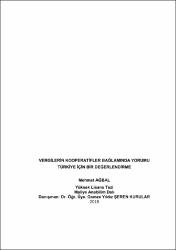| dc.contributor.author | Ağbal, Mehmet | |
| dc.date.accessioned | 2020-09-24T11:17:51Z | |
| dc.date.available | 2020-09-24T11:17:51Z | |
| dc.date.issued | 2019 | |
| dc.identifier.uri | https://hdl.handle.net/20.500.11776/3724 | |
| dc.description.abstract | Bireylerin günlük yaşamı için ihtiyaç duyduğu yiyecek, giyecek ve barınma gibi temel ihtiyaçlarını, daha verimli ve rasyonel şekilde sağlamak için oluşturulan işbirlikleri kooperatifçiliğin temellerini oluşturmuştur. Endüstri devrimi 19. Yüzyılda modern kooperatifçilik hareketinin doğmasını ve yaygınlaşmasını sağlamıştır. Türkiye’de kooperatifçilik hareketi Osmanlı Devleti döneminde Mithat Paşa’nın “Memleket Sandıkları” ve Cumhuriyet döneminde Atatürk’ün bir numaralı üyesi olduğu “Ankara Memurin Erzak Kooperatifi” ile gerçekleşmiştir. Cumhuriyetin ilk yıllarından itibaren kooperatiflerin ekonomi içerisinde istenilen seviyede aktif hale gelmesi için kooperatifçilik ilke ve hedefleri de dikkate alınarak, mevzuat düzenlemeleri yapılmıştır. Söz konusu mevzuat düzenlemeleri, başta vergi hukuku olmak üzere pek çok konuda tartışmalı ve yoruma açık hususlar ortaya çıkarmıştır. Bu çalışmada, kooperatiflerin muafiyet şartlarına ilişkin olarak, ortak dışı işlemlerin neler olduğu, ortak içi sayılan işlemler ve iktisadi işletme müessesinin nasıl uygulanacağıyla ilgili görüş ve öneriler bulunulacaktır. Yine kooperatif özel kanunları, katma değer vergisi ile diğer vergi ve harç kanunlarında kooperatiflere yönelik düzenlemelere ilişkin uygulamada karşılaşılan sorunlara yönelik çözüm önerileri açıklanmıştır. | en_US |
| dc.description.abstract | Collaborations, created to provide basic needs such as food, clothing and shelter for individuals' daily life in a more efficient and rational way, were the foundations of cooperatives. Industrial revolution provided the rising and extensive of the modern cooperative movement in the 19th century. Cooperative movement in Turkey was held during the Ottoman Empire period with Mithat Pasha -“Memleket Sandıkları” and Republic Era period with Ataturk who was the first member of the Cooperative named as “Ankara Memurin Erzak Kooperatifi”. Since the first years of the Republic Era period, the legislative arrangements have been made in order to enable the cooperatives to become active in the economy at the desired level by taking into account the principles and objectives of the cooperatives. These legislative arrangements have raised polemical and open-ended cases, particularly in tax law. This study covers the opinions and recommendations related with what are non-partner transactions, partner transactions and how to apply economic enterprise based on the exemption conditions of cooperatives. Furthermore, solutions for the problems encountered in the application within cooperative special laws, value added tax and other tax and duty laws are explained | en_US |
| dc.language.iso | tur | en_US |
| dc.publisher | Namık Kemal Üniversitesi | en_US |
| dc.rights | info:eu-repo/semantics/openAccess | en_US |
| dc.subject | Kooperatifçilik | en_US |
| dc.subject | Vergi Hukuku | en_US |
| dc.subject | Vergilendirme | en_US |
| dc.subject | The Cooperative System | en_US |
| dc.subject | Tax Law | en_US |
| dc.subject | Taxation | en_US |
| dc.title | Vergilerin kooperatifler bağlanmında yorumu Türkiye için bir değerlendirme | en_US |
| dc.title.alternative | Interpretation of taxes in the context of the Cooperatives An Evaluation for Turkey | en_US |
| dc.type | masterThesis | en_US |
| dc.department | Enstitüler, Sosyal Bilimler Enstitüsü, Maliye Ana Bilim Dalı | en_US |
| dc.relation.publicationcategory | Tez | en_US |



















